This article was co-authored by Claudia Carberry, RD, MS. Claudia Carberry is a Registered Dietitian specializing in kidney transplants and counseling patients for weight loss at the University of Arkansas for Medical Sciences. She is a member of the Arkansas Academy of Nutrition and Dietetics. Claudia received her MS in Nutrition from the University of Tennessee Knoxville in 2010.
There are 9 references cited in this article, which can be found at the bottom of the page.
This article has been viewed 56,551 times.
Tooth pain can have many different causes, including tooth decay, sensitivity caused by acidic foods, and braces. No matter why your teeth hurt, it is likely to make eating hard foods a challenge. If you can't stick to your soft food diet any longer, there are a few tricks you can use to make hard foods easier to eat.
Steps
Eating Carefully to Avoid Pain
-
1Chew more carefully. The easiest thing you can do to reduce the amount of pain you experience when eating hard foods is to be more careful about the way you chew. This is especially important if you plan on eating hard foods.[Image:Eat Hard Food When Your Teeth Hurt Step 1 Version 3.jpg|center]]
- Chew very slowly to avoid causing sharp pain.
- Avoid chewing with the affected teeth. For example, if the left side of your mouth is bothering you, try chewing all of your food on the right side until the pain subsides.[1]
-
2Cut your food into small pieces. Hard foods are even more difficult to chew when you put large pieces of them into your mouth at once. Make chewing easier for yourself by taking an extra moment to cut all of your food into smaller pieces.
- Foods that you need to bite into with your front teeth, like whole apples, large carrots, and corn on the cob, are especially bad. Be sure to cut these to prevent more pain and damage to your teeth.[2]
Advertisement -
3Cook food thoroughly to soften it. Cooking food in specific ways can also help make it softer and easier to chew, which means you can still eat the foods you want while experiencing less pain.[3] The more tender the food, the less it will bother your teeth.
- If you want to eat beef, consider preparing it in a slow cooker instead of grilling it. This will make it nice and tender, while still preserving the flavor.
- Try eating steamed or sauteed vegetables instead of raw vegetables.
-
4Puree or juice food. Another way to enjoy the foods you love without enduring pain is to puree or juice them. You'll still get all the flavor you were longing for, without the pain.[4]
- For example, if you want to eat carrots, but your teeth are too sore, consider drinking some carrot juice or eating some carrot soup.
Addressing the Cause of Your Pain
-
1See a dentist for persistent pain. If your pain is severe or lasts for more than a few days, schedule an appointment with a dentist right away.[5] You may have tooth decay, a loose filling, or a cracked tooth, all of which need to be addressed by a dentist.[6]
- If your pain is only occasional and not confined to a single spot, you probably have nothing to worry about, but you should still see your dentist regularly for cleanings.
- The sooner you see a dentist, the less likely your problem is to become more serious, so don't put it off.[7]
-
2Try a night guard. If several of your teeth suddenly begin to ache, it may be caused by teeth grinding, which people often do in their sleep. Wearing a night guard to bed will prevent you from grinding your teeth, which should make the pain go away.[8]
- If you are experiencing more stress in your life that you are used to, you may suddenly begin grinding your teeth.
-
3Address sinus congestion. Intense sinus congestion can sometimes cause pain that is easy to confuse with a toothache because it compresses nerves that are very close to the roots of your upper teeth. If your teeth have only started hurting since you have been congested, consider taking an over-the-counter remedy to relieve your congestion. You may just find that your tooth pain goes away as well.[9]
- If your congestion is persistent or accompanied by other symptoms, see a doctor.
-
4Think about recent changes in your diet. If your teeth just suddenly started causing you pain, it may be due to a change in your eating habits. If you have added any new acidic foods into your diet (like citrus fruits, coffee, or tomato sauce), you may want to cut back on them. Acidic foods are known to break down tooth enamel, which can lead to pain and a variety of dental problems.
- If you don't want to give up acidic foods, try to rinse your mouth out with water after you eat them. This will help prevent the acid from sticking around on your teeth after you've finished eating.
Temporarily Relieving Tooth Pain
-
1Take an over-the counter pain reliever. For severe pain, try taking an over-the-counter pain reliever such as ibuprofen, acetaminophen, or aspirin. Be sure to always read the bottle and follow the dosing instructions carefully.[10]
-
2Try a cold compress. Place an ice pack on your face near the affected tooth. Hold it there for up to 15 minutes. This should temporarily alleviate swelling and pain, making it easier to eat normally.[11]
- If you don't have an ice pack, wrap some loose ice in a thin piece of paper or plastic. A bag of frozen vegetables will also work.
- Repeat as often as needed.
-
3Try home remedies. Another way to temporarily relieve tooth pain so that you can eat the foods you want is to try using some natural home remedies. You may already have all of the ingredients you need to create one of these remedies in your kitchen.
- Mix one teaspoon of warm mustard oil with a pinch of turmeric powder until it forms a paste. Apply to your sore tooth and let it sit for five minutes before rinsing your mouth with warm water.
- Mix one teaspoon of asafoetida powder with a few drops on lemon juice until it becomes a paste. Apply to the tooth and let it sit for five minutes before rinsing your mouth with warm water.
- Heat a teaspoon of coconut oil in a frying pan and fry three cloves in the oil. Take the pan off of the heat, let the mixture cool, and then grind it to create a paste. Apply it to your tooth and let it sit for up to ten minutes before rinsing your mouth with warm water.
Expert Q&A
-
QuestionWhat are good foods to eat when your teeth hurt?
 Claudia Carberry, RD, MSClaudia Carberry is a Registered Dietitian specializing in kidney transplants and counseling patients for weight loss at the University of Arkansas for Medical Sciences. She is a member of the Arkansas Academy of Nutrition and Dietetics. Claudia received her MS in Nutrition from the University of Tennessee Knoxville in 2010.
Claudia Carberry, RD, MSClaudia Carberry is a Registered Dietitian specializing in kidney transplants and counseling patients for weight loss at the University of Arkansas for Medical Sciences. She is a member of the Arkansas Academy of Nutrition and Dietetics. Claudia received her MS in Nutrition from the University of Tennessee Knoxville in 2010.
Master's Degree, Nutrition, University of Tennessee Knoxville Master's Degree, Nutrition, University of Tennessee KnoxvilleExpert AnswerSofter foods may be easier to eat when your teeth hurt. These may include pureed foods such as mashed potatoes or ground meat.
Master's Degree, Nutrition, University of Tennessee KnoxvilleExpert AnswerSofter foods may be easier to eat when your teeth hurt. These may include pureed foods such as mashed potatoes or ground meat. -
QuestionWhat can I eat when my mouth is sore?
 Claudia Carberry, RD, MSClaudia Carberry is a Registered Dietitian specializing in kidney transplants and counseling patients for weight loss at the University of Arkansas for Medical Sciences. She is a member of the Arkansas Academy of Nutrition and Dietetics. Claudia received her MS in Nutrition from the University of Tennessee Knoxville in 2010.
Claudia Carberry, RD, MSClaudia Carberry is a Registered Dietitian specializing in kidney transplants and counseling patients for weight loss at the University of Arkansas for Medical Sciences. She is a member of the Arkansas Academy of Nutrition and Dietetics. Claudia received her MS in Nutrition from the University of Tennessee Knoxville in 2010.
Master's Degree, Nutrition, University of Tennessee Knoxville Master's Degree, Nutrition, University of Tennessee KnoxvilleExpert AnswerCall your dentist right away. You may want to drink a smoothie or choose nutritious foods that you can drink.
Master's Degree, Nutrition, University of Tennessee KnoxvilleExpert AnswerCall your dentist right away. You may want to drink a smoothie or choose nutritious foods that you can drink. -
QuestionWhat can I eat when my wisdom teeth hurt?
 Claudia Carberry, RD, MSClaudia Carberry is a Registered Dietitian specializing in kidney transplants and counseling patients for weight loss at the University of Arkansas for Medical Sciences. She is a member of the Arkansas Academy of Nutrition and Dietetics. Claudia received her MS in Nutrition from the University of Tennessee Knoxville in 2010.
Claudia Carberry, RD, MSClaudia Carberry is a Registered Dietitian specializing in kidney transplants and counseling patients for weight loss at the University of Arkansas for Medical Sciences. She is a member of the Arkansas Academy of Nutrition and Dietetics. Claudia received her MS in Nutrition from the University of Tennessee Knoxville in 2010.
Master's Degree, Nutrition, University of Tennessee Knoxville Master's Degree, Nutrition, University of Tennessee KnoxvilleExpert AnswerYou may want to eat soft, moist foods or chew on the other side of your mouth. Get assessed to have your wisdom teeth removed.
Master's Degree, Nutrition, University of Tennessee KnoxvilleExpert AnswerYou may want to eat soft, moist foods or chew on the other side of your mouth. Get assessed to have your wisdom teeth removed.
References
- ↑ https://www.atlas.dental/blog/managing-wisdom-tooth-pain-at-home
- ↑ https://www.mouthhealthy.org/en/nutrition/nutrition-concerns
- ↑ Pradeep Adatrow, DDS, MS. Board Certified Dentist & Oral Surgeon. Expert Interview. 30 September 2020.
- ↑ https://www.mouthhealthy.org/en/nutrition/nutrition-concerns
- ↑ Pradeep Adatrow, DDS, MS. Board Certified Dentist & Oral Surgeon. Expert Interview. 30 September 2020.
- ↑ http://www.deardoctor.com/inside-the-magazine/issue-15/tooth-pain/
- ↑ http://www.mayoclinic.org/healthy-lifestyle/adult-health/in-depth/dental/art-20047475?pg=2
- ↑ https://www.webmd.com/oral-health/guide/teeth-grinding-bruxism#1
- ↑ http://www.deardoctor.com/inside-the-magazine/issue-15/tooth-pain/
- ↑ https://www.nhs.uk/conditions/toothache/
- ↑ https://www.mayoclinic.org/first-aid/first-aid-toothache/basics/art-20056628
- ↑ Pradeep Adatrow, DDS, MS. Board Certified Dentist & Oral Surgeon. Expert Interview. 30 September 2020.
- ↑ http://www.mayoclinic.org/healthy-lifestyle/adult-health/in-depth/dental/art-20047475?pg=2
- ↑ http://www.dentakit.com/howtoeatwide.html
About This Article
If you want to eat hard foods when you have tooth pain, chew your food very slowly, and avoid chewing with the affected teeth if possible. Make large food like apples or large carrots easier to chew by cutting them into very small pieces before you eat, instead of using your teeth to take bites. You can also cook certain foods, like vegetables and meat, to make them softer and easier to chew. To avoid chewing some foods altogether, like fruits and veggies, use a blender or food processor to puree them into a juice. For more tips from our Dietary co-author, like how to ease your tooth pain with natural home remedies, keep reading!
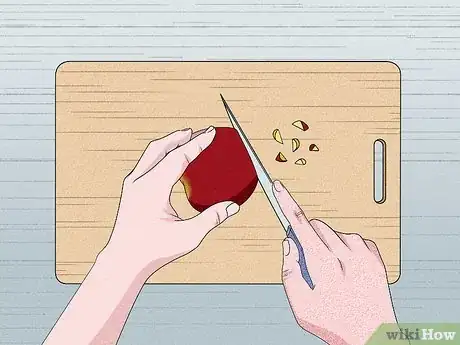
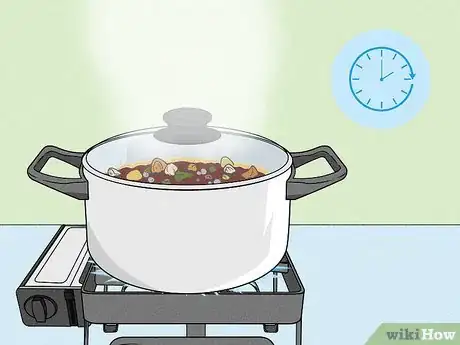

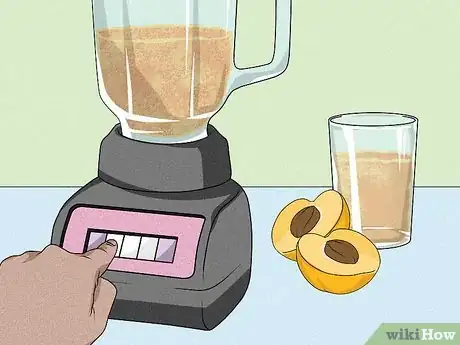
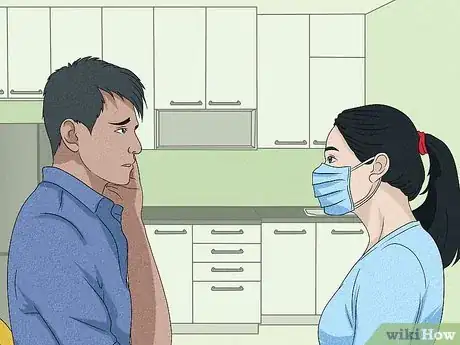
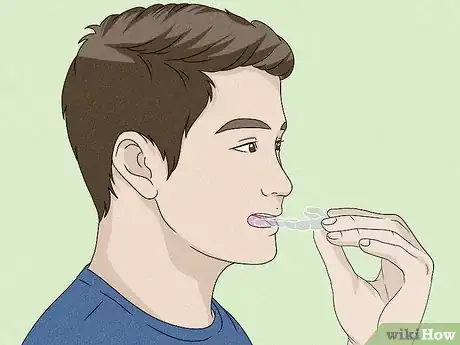
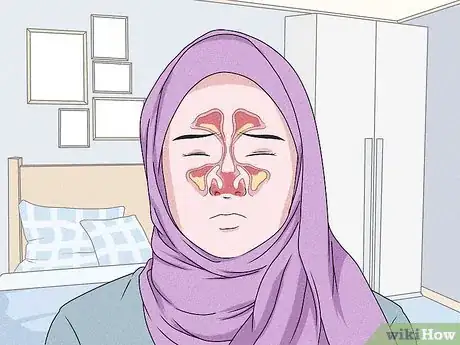
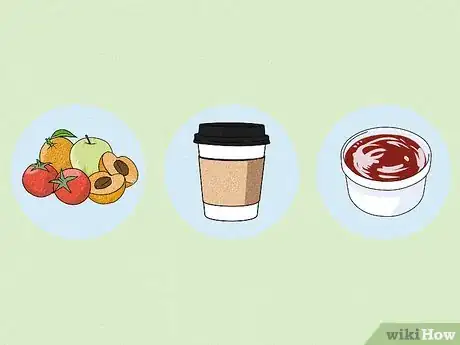
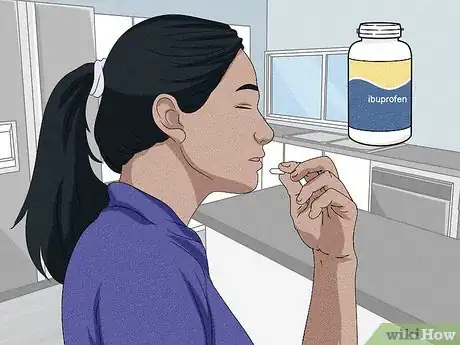
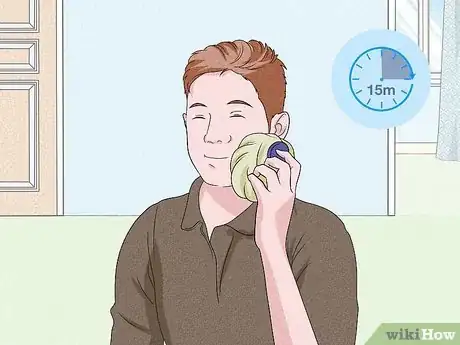
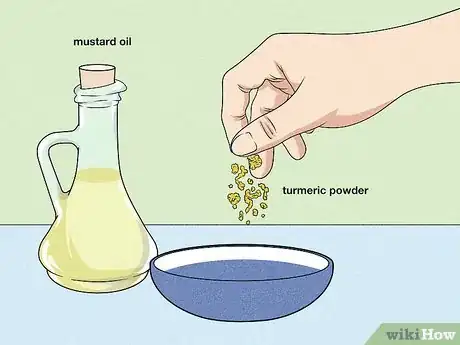
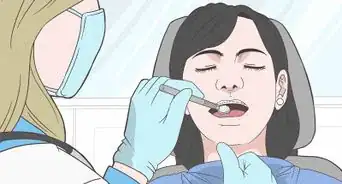

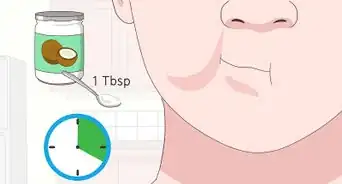
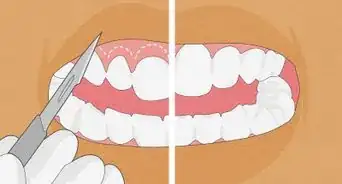
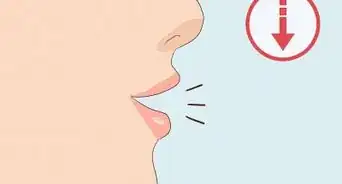
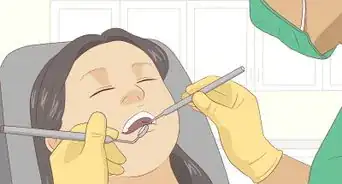
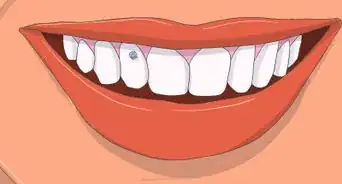
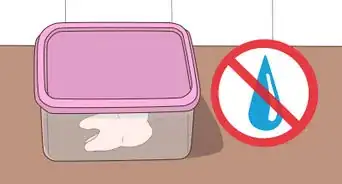
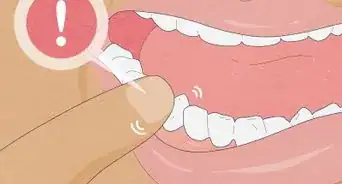
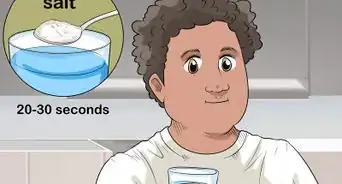

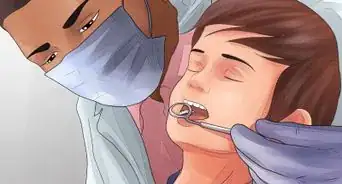
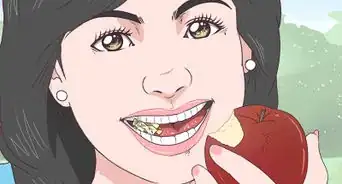








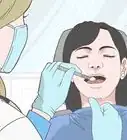

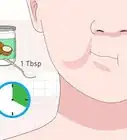
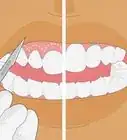



































Medical Disclaimer
The content of this article is not intended to be a substitute for professional medical advice, examination, diagnosis, or treatment. You should always contact your doctor or other qualified healthcare professional before starting, changing, or stopping any kind of health treatment.
Read More...